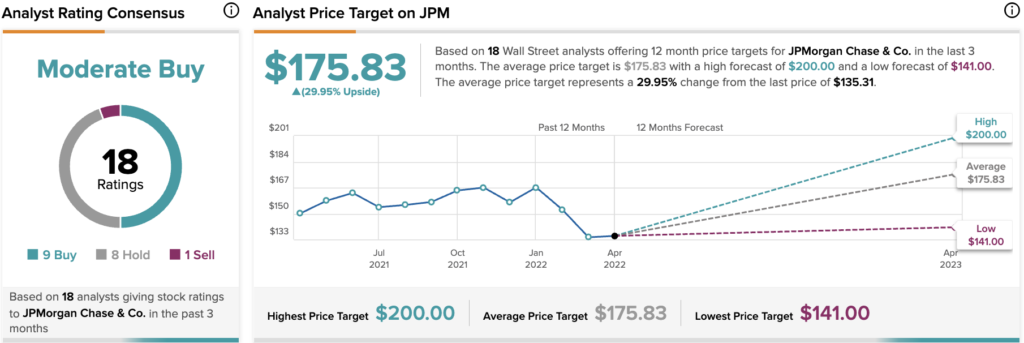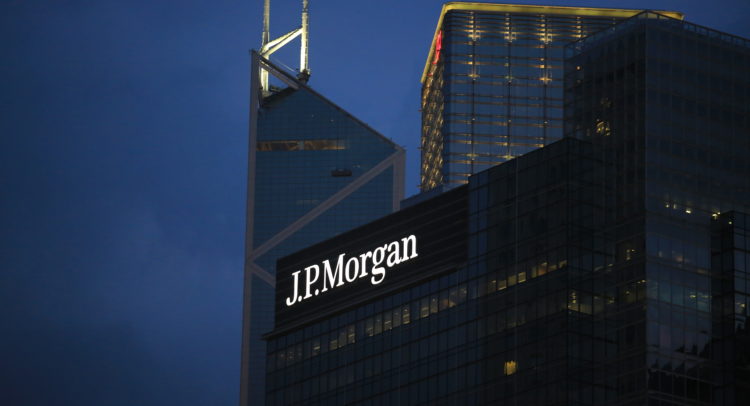Bank stocks took a hit during the pandemic because of low-interest rates. However, things are looking up for financial institutions as the Fed looks to reign in inflation through interest rate hikes. JPMorgan Chase (JPM) predicts higher net interest income, but investors don’t seem to be biting. That is a shame because the company is one of the most successful investment banks in the world.
Discover the Best Stocks and Maximize Your Portfolio:
- See what stocks are receiving strong buy ratings from top-rated analysts.
- Filter, analyze, and streamline your search for investment opportunities with TipRanks’ Stock Screener.
JPMorgan Chase and Co. is a multinational investment bank and financial services company headquartered in New York. It is the largest bank in the U.S., with over $3 trillion in assets.
JP Morgan is a top-tier play in banking, with its strong balance sheets and diverse assets. However, the stock has not reflected this performance over the last few months.
Part of it has to do with the muted outlook for the year. JPMorgan Chase is looking at a roughly 8% increase in expenses this year, with technology investments one of its main priorities. The other issue is the macroeconomic environment. There are worries that the Russian wa on Ukraine could eventually lead to a global economic slowdown. Much of this has to do with growing oil prices. Therefore, investors are focusing largely on dividend stocks and retirement plans.
That, however, doesn’t necessarily not mean you stay away from JPMorgan.
Why is JPMorgan’s Stock Down?
Much like other bank stocks, JPMorgan did not have a great time during the pandemic due to near-zero interest rates. However, JPM could navigate these trying times by adjusting its strategies and concentrating on new areas.
The bank’s CIB division had outstanding recent years in capital markets and investment banking. In 2021, the banking giant experienced impressive growth within this business segment.
However, growth for this segment is expected to normalize this year. In addition, when reporting fourth-quarter earnings, JPMorgan said it expects expenses to increase to approximately $77 billion this year from $71 billion in 2021. As expenses increase, so do executives’ difficulties when reaching their financial targets. However, CEO Jamie Dimon believes the company can still achieve their return on tangible equity goal of 17% by relying on other aspects of its business.
It’s also worth noting that JPMorgan has one of the largest tech budgets in banking. This approach is expected to provide room for expansion, with the fintech sector growing rapidly.
However, investors are not yet convinced. Hence, the company finds itself in the position it’s in now.
Unusual Strategy Paying Dividends
In today’s day and age, everything is about disruption. With the emergence of fintech, it is expected that there will be a lot of disruption in the financial industry. This will require more and more people to enter the field of finance.
To compete with fintech companies, traditional financial institutions need to up their game in terms of technology and creativity.
However, JPMorgan has decided to go against the grain. When most banks are shuttering their physical brick-and-mortar sites, the company has doubled down on its retail expansion. JPMorgan announced a $20 billion investment in 2018 that would add branches to new markets over the next five years. The company is making significant progress toward its goal of launching 400 units in new markets and other avenues of growth.
JPMorgan’s second-quarter earnings call revealed that its branch plan is proceeding very well and has brought in almost $7 billion in deposits and investments.
JPMorgan wanted to expand the number of branches and gain a foothold in markets where it could do well. This decision was not based on square footage but more on physical client-facing locations to provide better service. So far, the results have been promising for JPMorgan Chase.
JPMorgan is a Quality Dividend Performer
Dividend stocks are not only attractive for investors because they provide consistent income, but it is also important to know what factors could influence the share price and which ones are likely to increase or decrease in value.
JPM has proven to be a reliable source of dividend income for investors. With a roughly 25% dividend payout, you’ll always know your money’s worth. With a strong balance sheet, good growth rate, and a conservative payout, this is one of the best dividend stocks in the financial space.
Wall Street’s Take
Wall Street analysts surveyed in the last three months have predicted lofty values for JPMorgan Chase. JPM has a Moderate Buy consensus rating based on nine Buys, eight Holds, and one Sell.
The average price target for JPM stock is $175.83, which implies a 29.95% upside.

The Bottom Line
The stock is fairly priced with moderate growth and a steady dividend that resists market-wide losses.
The company has a diverse portfolio with multiple revenue streams. This helps the company stay resilient to macroeconomic changes and better prepare for times when the economy is attempting a rebound.
Plus, Jamie Dimon, the CEO of JPMorgan, has also been tremendously effective with shareholders. He is one of the most iconic CEOs in recent memory and has done a good job representing the firm .
If you are looking for a safe investment amongst all the volatility, it’s better to go with JPMorgan.
Download the TipRanks mobile app now
To find good ideas for stocks trading at attractive valuations, visit TipRanks’ Best Stocks to Buy, a newly launched tool that unites all of TipRanks’ equity insights.
Read full Disclaimer & Disclosure.









